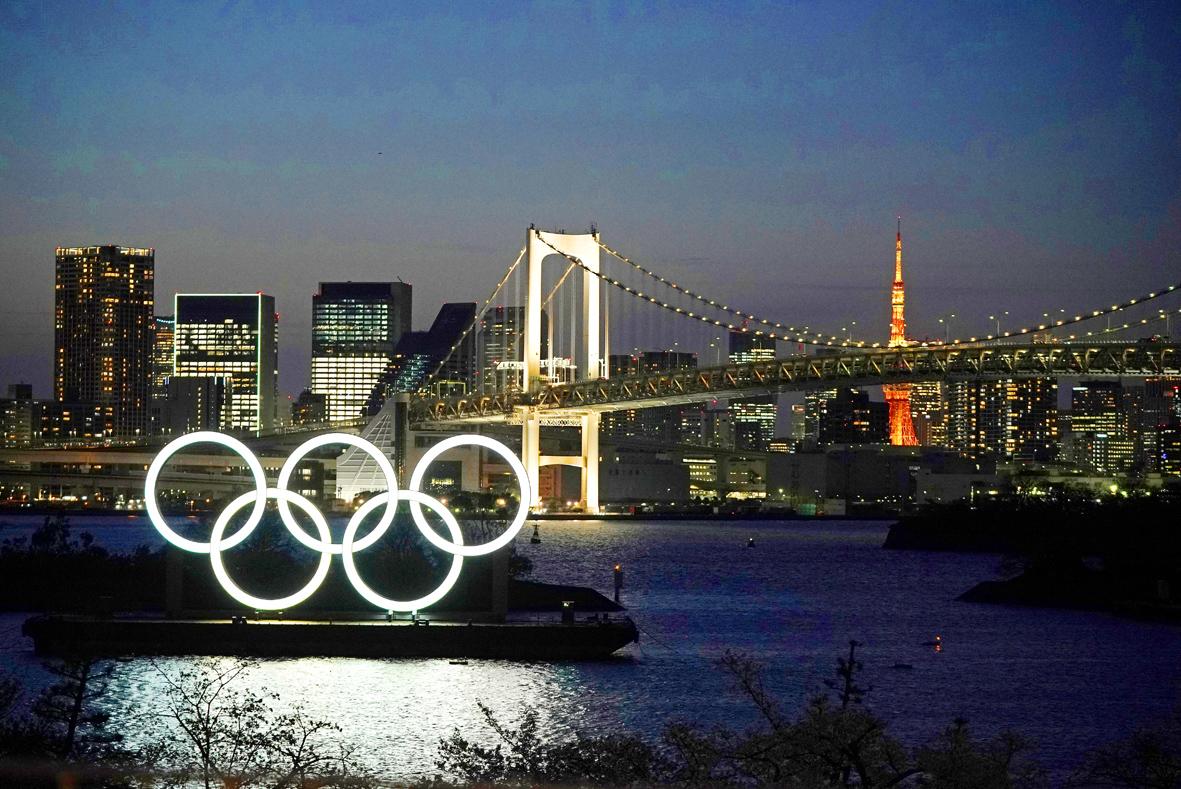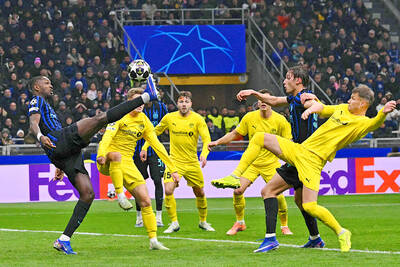The International Olympic Committee (IOC) is working with sports bodies to arrange a July-to-August window next year for the postponed Tokyo Olympics and hopes to confirm the schedule within a month, Japan’s Yomiuri Shimbun reported yesterday.
John Coates, head of the IOC’s coordination commission for the Tokyo Olympics, told the newspaper that the Games would have to be held between the tennis Grand Slams of Wimbledon, scheduled to end in mid-July, and the US Open, which starts in late August.
“We want to more or less finalize the dates in four weeks’ time,” the newspaper quoted Coates as saying.

Photo: EPA-EFE
Coates, who is also president of the Australian Olympic Committee, said that the summer scheduling would be dependent on avoiding clashes with the World Aquatics Championships (July 16 to Aug. 1) and the World Athletics Championships (Aug. 6 to 15).
World Athletics president Sebastian Coe has said that the World Athletics Championships in Eugene, Oregon, could be moved back to 2022 if necessary.
Coates told the newspaper that the hope was to follow the same arrangements next year that had been planned for this year, including holding the marathon in the northern city of Sapporo instead of Tokyo to escape the heat.
The Australian Olympic Committee confirmed the newspaper report’s veracity and told reporters in a statement that Coates had “proffered a view, but confirms a range of options are on the table for the IOC.”
The Tokyo Games organizing committee yesterday launched a task force to resolve issues linked to the postponement, an “unprecedented” and complex task that includes reviewing dates for the Games and securing venues.
No specifics have been discussed yet on the timing of the delayed Games, but a date needs to be decided as soon as possible, senior official Hidemasa Nakamura told reporters after the task force’s first meeting.
Rescheduling would involve “massive” additional costs, organizers said.
“One by one, we need to ensure the problems we face can be solved,” Tokyo Games organizing committee CEO Toshiro Muto said in opening remarks at the task force’s first meeting.
“Additional expenses are going to be quite massive we assume. With regards to our revenues, we need to make a lot of effort there,” he added.
Muto gave no estimates for how much the process of postponing the Olympic and Paralympic Games could cost.
However, the Nikkei said organizers have estimated that it would cost an extra US$2.7 billion, including for venue rentals, rebooking hotels and additional payments for staff and security guards, among others.
Those costs could still come down depending on the outcome of negotiations, the newspaper said.
Muto said that organizers would not rip up their existing plans, but added: “I guess we need to step back a bit.”
“Sometimes you need to go back to the drawing board,” he added.
The Olympics have never faced this much disruption in peacetime, and the decision to delay the event has created unprecedented challenges, Tokyo Games organizing committee president Yoshiro Mori said.
Tokyo Games staff “will experience difficulties they have never experienced before. I am sure they will rise to the occasion. This is going to be a very difficult task that we are facing,” he said.
Muto underscored the scale of the task ahead, saying that even he “didn’t imagine at all we would be tested to this degree.”
“We want to make sure we go beyond this test and that next year in Tokyo the torch is lit for the Olympic and Paralympic Games. We believe this is the mission we face,” he added.

Fenerbahce on Thursday earned a rare 2-1 win in England, but were still knocked out of the UEFA Europa League by Nottingham Forest in the playoffs. Forest entered the second leg with a healthy 3-0 lead from the opener in Istanbul — where Vitor Pereira made an impact in his first game in charge — and that proved enough to advance to the round-of-16 with a 4-2 aggregate score. The result was a boost for Forest, struggling at 17th place in the Premier League, in their return to Europe after three decades. They next face Real Betis Balompie or Kerem Akturkoglu gave Fenerbahce

The Cleveland Cavaliers on Tuesday emphatically got back to winning ways in the NBA, coasting to a 109-94 victory over the New York Knicks as their recent star signing, James Harden, scored 20 points. The Cavs took the lead barely a minute into the game with an Evan Mobley three-pointer and never gave it up in a thoroughly comfortable night for the red-hot Ohio franchise. Former NBA Most Valuable Player (MVP) Harden, who was brought in from the Los Angeles Clippers this month, has never won a championship, despite being one of the most decorated players in the league. That was a key

Soccer officials yesterday offered “full support and assistance” to the Iranian team in Australia for the AFC Women’s Asian Cup after the US and Israel launched massive attacks on their homeland. Iran’s 26-strong squad arrived on the Gold Coast days before the strikes on Saturday killed supreme leader Ayatollah Ali Khamenei, as Washington and Tel Aviv seek to topple the Islamic republic. They are due to open their tournament today against South Korea. The AFC in a statement said it “continues to closely monitor the recent developments in the Middle East during this challenging period.” “The AFC’s foremost priority remains the welfare, safety and

HAT-TRICK: In the other games, Newcastle United and Leverkusen also advanced, as did Atletico Madrid, with Alexander Sorloth scoring three goals What a difference a year makes. Or nine months to be precise. Last season, Inter reached the UEFA Champions League final in style, with thrilling victories over Bayern Munich and Barcelona, but on Tuesday, the Italian giants limped out of the competition with a disappointing 2-1 loss at home to Bodo/Glimt — knocked out in the playoff round 5-2 on aggregate — in what is being labeled as one of the biggest upsets in Champions League history. It was not the first major upset the tiny Norwegian team have pulled off this season after wins over Manchester City and Atletico Madrid, and